 Tìm kiếm
Tìm kiếm
Chương 3 Luật Sĩ quan Quân đội nhân dân Việt Nam 1999: Nghĩa vụ,trách nhiệm và quyền lợi của sĩ quan
| Số hiệu: | 16/1999/QH10 | Loại văn bản: | Luật |
| Nơi ban hành: | Quốc hội | Người ký: | Nông Đức Mạnh |
| Ngày ban hành: | 21/12/1999 | Ngày hiệu lực: | 01/04/2000 |
| Ngày công báo: | 15/02/2000 | Số công báo: | Số 6 |
| Lĩnh vực: | Bộ máy hành chính | Tình trạng: | Còn hiệu lực |
TÓM TẮT VĂN BẢN
Văn bản tiếng việt
Văn bản tiếng anh
Sĩ quan có nghĩa vụ sau đây:
1. Sẵn sàng chiến đấu, hy sinh bảo vệ độc lập, chủ quyền, toàn vẹn lãnh thổ của Tổ quốc, bảo vệ Đảng Cộng sản Việt Nam và Nhà nước Cộng hoà xã hội chủ nghĩa Việt Nam; tham gia xây dựng đất nước, bảo vệ tài sản và lợi ích của Nhà nước, của cơ quan, tổ chức; bảo vệ tính mạng, tài sản, quyền và lợi ích hợp pháp của cá nhân;
2. Thường xuyên giữ gìn và trau dồi đạo đức cách mạng, học tập, rèn luyện nâng cao trình độ, kiến thức, năng lực về chính trị, quân sự, văn hoá, chuyên môn và thể lực để hoàn thành nhiệm vụ;
3. Tuyệt đối phục tùng tổ chức, phục tùng chỉ huy; nghiêm chỉnh chấp hành điều lệnh, điều lệ, chế độ, quy định của quân đội; giữ bí mật quân sự, bí mật quốc gia;
4. Thường xuyên chăm lo lợi ích vật chất và tinh thần của bộ đội;
5. Gương mẫu chấp hành và vận động nhân dân thực hiện đường lối, chủ trương của Đảng, chính sách, pháp luật của Nhà nước; tôn trọng và gắn bó mật thiết với nhân dân.
1. Chịu trách nhiệm trước pháp luật và cấp trên về những mệnh lệnh của mình, về việc chấp hành mệnh lệnh của cấp trên và việc thừa hành nhiệm vụ của cấp dưới thuộc quyền;
2. Lãnh đạo, chỉ huy, quản lý, tổ chức thực hiện mọi nhiệm vụ của đơn vị theo chức trách được giao; bảo đảm cho đơn vị chấp hành triệt để đường lối, chủ trương của Đảng, chính sách, pháp luật của Nhà nước, điều lệnh, điều lệ, chế độ, quy định của quân đội, sẵn sàng chiến đấu và hoàn thành tốt mọi nhiệm vụ trong bất kỳ hoàn cảnh, điều kiện nào;
3. Khi nhận mệnh lệnh của người chỉ huy, nếu sĩ quan có căn cứ cho là mệnh lệnh đó trái pháp luật thì phải báo cáo ngay với người ra mệnh lệnh; trong trường hợp vẫn phải chấp hành mệnh lệnh thì báo cáo kịp thời lên cấp trên trực tiếp của người ra mệnh lệnh và không phải chịu trách nhiệm về hậu quả của việc thi hành mệnh lệnh đó.
Sĩ quan không được làm những việc trái với pháp luật, kỷ luật quân đội và những việc mà pháp luật quy định cán bộ, công chức không được làm.
Sĩ quan biệt phái có nghĩa vụ, trách nhiệm và quyền lợi sau đây:
1. Thực hiện nghĩa vụ, trách nhiệm và quyền lợi như sĩ quan đang công tác trong quân đội; được cơ quan, tổ chức nơi đến biệt phái bảo đảm điều kiện làm việc và sinh hoạt;
2. Thực hiện nhiệm vụ do Bộ Quốc phòng giao, làm tham mưu về nhiệm vụ quốc phòng và chịu sự quản lý của cơ quan, tổ chức nơi đến biệt phái.
1. Sĩ quan được Đảng và Nhà nước chăm lo, khuyến khích và tạo điều kiện để phát triển tài năng.
2. Sĩ quan được đào tạo, bồi dưỡng tại các trường trong và ngoài quân đội theo yêu cầu công tác.
Sĩ quan tại ngũ được hưởng tiền lương, phụ cấp, nhà ở và điều kiện làm việc như sau:
1. Chế độ tiền lương và phụ cấp do Chính phủ quy định; bảng lương của sĩ quan căn cứ vào cấp bậc quân hàm và chức vụ được quy định phù hợp với tính chất, nhiệm vụ của quân đội; thâm niên tính theo mức lương hiện hưởng và thời gian phục vụ tại ngũ. Sĩ quan được hưởng phụ cấp, trợ cấp như đối với cán bộ, công chức có cùng điều kiện làm việc và phụ cấp, trợ cấp có tính chất đặc thù quân sự;
2. Đủ tiêu chuẩn, đến thời hạn xét thăng quân hàm nhưng đã có bậc quân hàm cao nhất của chức vụ đang đảm nhiệm hoặc đã có bậc quân hàm Đại tá 4 năm trở lên mà chưa được thăng quân hàm cấp Tướng thì được nâng lương theo chế độ tiền lương của sĩ quan;
3. Nếu giữ nhiều chức vụ trong cùng một thời điểm thì được hưởng quyền lợi của chức vụ cao nhất;
4. Khi được giao chức vụ thấp hơn chức vụ đang đảm nhiệm theo quy định tại điểm a khoản 3 Điều 21 của Luật này thì được giữ nguyên quyền lợi của chức vụ cũ;
5. Khi có quyết định miễn nhiệm chức vụ thì được hưởng các quyền lợi theo cương vị mới;
6. Được bảo đảm điều kiện để thực hiện nhiệm vụ theo quy định của Bộ trưởng Bộ Quốc phòng;
7. Được bảo đảm nhà ở, đăng ký hộ khẩu theo quy định của Chính phủ.
1. Sĩ quan tại ngũ được nghỉ những ngày lễ theo quy định của Bộ luật lao động và nghỉ theo quy định của Bộ trưởng Bộ Quốc phòng.
2. Khi có lệnh tổng động viên hoặc động viên cục bộ và trong thời chiến, Bộ trưởng Bộ Quốc phòng được ra lệnh đình chỉ chế độ nghỉ của sĩ quan; mọi sĩ quan đang nghỉ phải về ngay đơn vị.
1. Sĩ quan tại ngũ được chăm sóc sức khoẻ; khi bị thương, ốm đau ở xa các cơ sở quân y hoặc mắc những bệnh mà cơ sở quân y không có khả năng điều trị thì được khám bệnh, chữa bệnh tại các cơ sở dân y, được quân đội thanh toán viện phí.
2. Bố, mẹ, người nuôi dưỡng hợp pháp của chồng và của vợ, vợ hoặc chồng và con dưới 18 tuổi của sĩ quan tại ngũ không có chế độ bảo hiểm y tế thì được khám bệnh, chữa bệnh miễn hoặc giảm viện phí tại các cơ sở quân y và dân y theo quy định của Chính phủ.
Khi chức vụ đang đảm nhiệm không còn nhu cầu bố trí sĩ quan, nếu sĩ quan có đủ điều kiện thì được xét chuyển sang quân nhân chuyên nghiệp hoặc công chức quốc phòng và được hưởng mức lương không thấp hơn khi còn là sĩ quan.
1. Sĩ quan thôi phục vụ tại ngũ trong các trường hợp sau đây:
a) Đủ điều kiện nghỉ hưu;
b) Hết tuổi phục vụ tại ngũ quy định tại khoản 1 Điều 13 của Luật này;
c) Do thay đổi tổ chức, biên chế mà không còn nhu cầu bố trí sĩ quan, quân nhân chuyên nghiệp, công chức quốc phòng;
d) Đã quá thời hạn kéo dài xét thăng quân hàm quy định tại khoản 1 Điều 19 của Luật này mà vẫn không đủ tiêu chuẩn thăng quân hàm;
đ) Không còn đủ tiêu chuẩn quy định đối với sĩ quan tại ngũ.
2. Sĩ quan thôi phục vụ tại ngũ theo một trong các hình thức sau đây:
a) Nghỉ hưu;
b) Chuyển ngành;
c) Phục viên.
3. Khi thôi phục vụ tại ngũ, nếu đủ tiêu chuẩn và chưa hết hạn tuổi dự bị hạng 2 quy định tại Điều 13 của Luật này thì chuyển sang ngạch sĩ quan dự bị.
Sĩ quan được nghỉ hưu khi:
1. Đủ điều kiện theo quy định bảo hiểm xã hội của Nhà nước;
2. Trong trường hợp chưa đủ điều kiện nghỉ hưu theo quy định tại khoản 1 Điều này, quân đội không còn nhu cầu bố trí sĩ quan, quân nhân chuyên nghiệp, công chức quốc phòng hoặc không chuyển ngành được, nếu nam sĩ quan có đủ 25 năm và nữ sĩ quan có đủ 20 năm phục vụ trong quân đội trở lên thì được nghỉ hưu.
1. Sĩ quan nghỉ hưu được hưởng quyền lợi sau đây:
a) Lương hưu tính trên cơ sở quy định tại khoản 1 Điều 31 của Luật này;
b) Sử dụng quân phục, quân hiệu, cấp hiệu, phù hiệu trong những ngày lễ và những cuộc hội họp, những buổi giao lưu truyền thống của quân đội;
c) Được chính quyền địa phương nơi sĩ quan cư trú hợp pháp đăng ký hộ khẩu, tạo điều kiện để làm ăn sinh sống; trường hợp chưa có nhà ở thì được bảo đảm nhà ở hoặc đất ở theo quy định của Chính phủ;
d) Khám bệnh, chữa bệnh theo chế độ bảo hiểm y tế tại các cơ sở quân y và dân y.
2. Sĩ quan chuyển ngành được hưởng quyền lợi sau đây:
a) Nhà nước bảo đảm đào tạo về chuyên môn, nghiệp vụ cần thiết đối với những sĩ quan chuyển ngành theo yêu cầu của tổ chức;
b) Bảo lưu mức lương sĩ quan tại thời điểm chuyển ngành trong thời gian tối thiểu là 18 tháng;
c) Khi nghỉ hưu được hưởng phụ cấp thâm niên tính theo thời gian phục vụ tại ngũ và cấp bậc quân hàm tại thời điểm chuyển ngành; trường hợp mức lương hiện hưởng thấp hơn mức lương sĩ quan tại thời điểm chuyển ngành thì được lấy mức lương sĩ quan tại thời điểm chuyển ngành để tính lương hưu;
d) Các quyền lợi quy định tại điểm b và điểm c khoản 1 Điều này.
3. Sĩ quan phục viên được hưởng quyền lợi sau đây:
a) Trợ cấp tạo việc làm và trợ cấp phục viên một lần;
b) Nếu có đủ 15 năm phục vụ trong quân đội trở lên, khi ốm đau được khám bệnh, chữa bệnh miễn hoặc giảm viện phí tại cơ sở quân y theo quy định của Bộ trưởng Bộ Quốc phòng;
c) Các quyền lợi quy định tại điểm b và điểm c khoản 1 Điều này.
4. Sĩ quan có thời gian trực tiếp chiến đấu, phục vụ chiến đấu hoặc công tác ở địa bàn, ngành nghề có tính chất đặc thù thì được quy đổi thời gian đó để tính hưởng quyền lợi khi thôi phục vụ tại ngũ.
Chính phủ quy định cụ thể việc thực hiện Điều này.
OBLIGATIONS, RESPONSIBILITIES AND INTERESTS OF OFFICERS
Article 26.- Obligations of officers
The officers shall have the following obligations:
1. To be ready to fight and sacrifice for the independence, sovereignty and territorial integrity of the Fatherland, to protect the Communist Party of Vietnam and the State of the Socialist Republic of Vietnam; to take part in national construction, to protect the property and interests of the State, agencies and organizations; to protect the life, property, legitimate rights and interests of individuals;
2. To regularly preserve and foster the revolutionary virtues, study and train themselves in order to raise their professional levels, knowledge, political, military, cultural and professional capabilities as well as their physical strength to fulfill their tasks.
3. To absolutely submit to their organizations and commanders; to strictly abide by the army rules, statutes, regimes and regulations; to keep the military and State secrets;
4. To constantly care for the material and spiritual interests of the army men;
5. To exemplarily observe and mobilize people to observe the Party’s lines and undertakings and the State’s policies and laws; to respect and maintain close contact with people.
Article 27.- Responsibilities of officers
The officers shall have the following responsibilities:
1. To take responsibility before law and their superiors for the orders they issue, for the obedience to the superiors’ orders and the task performance by their subordinates.
2. To lead, command, manage and organize the implementation of all tasks of their units according to their assigned responsibilities; to ensure that their units strictly adhere to the Party’s lines and undertakings, abide by the State’s laws and policies, the army’s rules, statutes, regimes and regulations and are ready to fight and well fulfill all tasks in any circumstance and under any condition;
3. Upon receipt of orders from their commanders, if officers have grounds to believe that such orders contravene laws, they shall have to immediately report such to the persons who have issued such orders; in cases where they still have to obey the orders, they shall have to promptly report to the immediate superiors of the persons who have issued such orders and shall not have to bear responsibility for the consequences arising from the implementation of such orders.
Article 28.- Things must not be done by officers
Officers must not do things contrary to laws and/or the army disciplines and things not to be done by State officials and employees as prescribed by law.
Article 29.- Obligations, responsibilities and interests of officers on detachment
Officers on detachment shall have the following obligations, responsibilities and interests:
1. To fulfill the obligations and responsibilities and enjoy the interests like officers on active service in the army; to be provided with working and living conditions by the agencies and/or organizations they are detached to.
2. To perform the tasks assigned by the Ministry of Defense providing advices on defense tasks and subject to the management by the agencies or organizations they are detached to.
Article 30.- Training and fostering for officers
1. Officers are cared for, encouraged and given conditions by the Party and the State to develop their talents.
2. Officers shall be trained and fostered at schools inside and outside the army according to work requirements.
Article 31.- Salary, allowance, dwelling houses and working conditions for active officers
Officers on active service shall be entitled to salary, allowances, dwelling houses and working conditions as follows:
1. The salary and allowance regime is stipulated by the Government; the officers’ salary scales based on army ranks, grades and posts shall be stipulated in conformity with the characteristics and tasks of the army; the seniority based on the current salary scales and the duration on active service in the army. Officers shall enjoy allowances and subsidies of particularly military nature;
2. Officers who fully meet the criteria and are due for rank promotion consideration but have been bestowed the highest ranks of the posts they are holding or the rank of colonel for four years or more without having been promoted to the general rank shall enjoy the salary increase according to the salary regime for officers;
3. If an officer concurrently holds many posts at a time, he/she shall be entitled to the interests prescribed for the highest post;
4. When being assigned posts lower than their current posts as provided for at Point a, Clause 3, Article 21 of this Law, the officers shall be entitled to the interests prescribed for their former posts;
5. When there is a decision to relieve an officer from his/her post, he/she shall enjoy the interests according to new position;
6. Being provided with conditions to perform their tasks according to the regulations of the Minister of Defense;
7. Being provided with dormitories and civic status registration under the regulations of the Government.
Article 32.- The regime of active officers’ rests
1. Active officers are entitled to public holidays as prescribed by the Labor Code and other holidays prescribed by the Minister of Defense.
2. Upon the general or local mobilization orders and during the war time, the Minister of Defense may issue order to suspend the officers’ rest regime; all officers being on holidays must immediately return to their units.
Article 33.- Healthcare for active officers and their families
1. Active officers shall be provided with healthcare; when getting wounded or sick at places far from military medical establishments or suffering from diseases which cannot be cured by military medical establishments, officers are entitled to medical examination and treatment at civil medical establishments with hospital fees paid by the army.
2. The fathers, mothers, lawful fosterers of the husbands and wives, the wives or husbands and under-18 children of active officers, who have no medical insurance, shall be provided with medical examination and treatment with hospital fees reduced or exempt at military and civil medical establishments according to the Government’s regulations.
Article 34.- Active officers transferred to work as professional army men or military employees
When current posts no longer require the employment of officers, the concerned officers, if fully meeting the prescribed conditions, shall be considered for transfer to the status of professional army men or military employees and enjoy salaries not lower than those while they were officers.
Article 35.- Demobilized officers
1. Officers shall be demobilized in the following cases:
a) They meet the conditions for retirement;
b) Their ages surpass the active service ages prescribed in Clause 1, Article 13 of this Law;
c) The employment of officers, professional army men and/or military employees is no longer required due to changes in organizations and staff;
d) They are not qualified for rank promotion though the prolonged period for rank promotion consideration prescribed in Clause 1, Article 19 of this Law has expired;
e) They no longer satisfy the criteria prescribed for active officers.
2. Officers are discharged from active service in one of the following forms:
a) Retirement;
b) Transfer to civil organizations;
c) Demobilization and return to native places.
3. When being discharged from the active service, if meeting all criteria and still being in the class-two reserve ages prescribed in Article 13 of this Law, the officers shall be transferred to the status of reserve officers.
Article 36.- Retirement conditions for officers
Officers may retire when:
1. They fully meet conditions according to the State’s regulations on social insurance;
2. Where the retirement conditions prescribed in Clause 1, this Article, are not fully met while the army no longer requires the employment of officers, professional army men and/or military employees or they cannot be transferred to civil organizations, the officers may retire if they have already served the army for full 25 years, for male officers, or full 20 years, for female officers.
Article 37.- Interests of officers discharged from active service
1. The retired officers shall enjoy the following interests:
a) Pensions calculated according to regulations in Clause 1, Article 31 of this Law;
b) Using military uniforms, shoulder straps and insignia on public holidays, conferences, meetings for the army’s traditional exchanges;
c) Being provided with civic status registration and given conditions to live and work by the administration in localities where the officers reside lawfully; where officers have no dwelling houses, they shall be provided with dwelling houses or residential land according to the Government’s regulations;
d) Being provided with medical examination and treatment under the medical insurance regime at military and civil medical establishments.
2. The transferred officers shall enjoy the following interests:
a) The State shall provide necessary professional training for transferred officers at the request of organizations;
b) To have their salary scales at the time of transfer reserved for a minimum period of 18 months;
c) When retiring, to enjoy the seniority allowances calculated according to the duration on active service in the army and their officers’ grades at the time of transfer; where their current salary scales are lower than their officers’ salary scales at the time of transfer, the latter shall be used for calculation of their pensions;
d) The interests prescribed at Point b and Point c, Clause 1, this Article.
3. Demobilized officers shall enjoy the following interests:
a) Employment allowances and lump-sum demobilization allowance;
b) If having full 15 or more years on active service in the army, when falling sick, they shall be given medical examination and treatment with hospital fees being exempt or reduced at military medical establishments as prescribed by the Minister of Defense;
c) The interests prescribed at Point b and Point c, Clause 1, this Article.
4. Officers who have had periods of time directly engaged in combat, combat service or working in particular localities, branches and trades shall be entitled to have such periods of time calculated according to preferential coefficient for enjoyment of interests when they are discharged from active service in the army.
The Government shall specify the implementation of this Article.
Cập nhật
Bài viết liên quan
Tuổi nghỉ hưu của quân nhân chuyên nghiệp mới nhất 2025 là bao nhiêu?
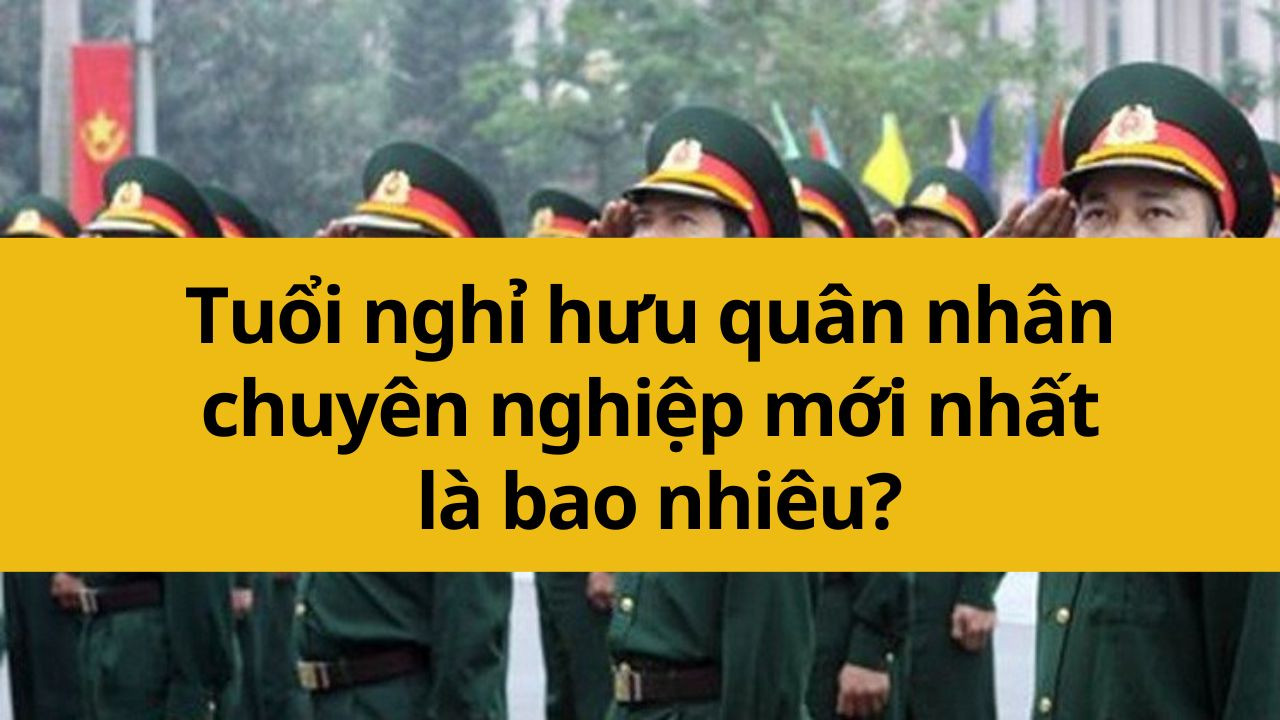
Tuổi nghỉ hưu của quân nhân chuyên nghiệp mới nhất 2025 là bao nhiêu?
Tuổi nghỉ hưu của quân nhân chuyên nghiệp là một trong những vấn đề quan trọng trong việc quản lý nhân sự trong quân đội. Mỗi năm, các quy định về độ tuổi nghỉ hưu có thể được điều chỉnh để phù hợp với yêu cầu công tác và sự phát triển của lực lượng vũ trang. Trong năm 2025, độ tuổi nghỉ hưu của quân nhân chuyên nghiệp đã được quy định cụ thể, nhằm đảm bảo sự ổn định và hiệu quả trong công tác tổ chức, điều động nhân sự. Bài viết này sẽ cập nhật thông tin về tuổi nghỉ hưu của quân nhân chuyên nghiệp theo quy định mới nhất. 31/12/2024Sĩ quan quân đội khi nghỉ hưu thì được hưởng những quyền lợi gì mới nhất 2025?
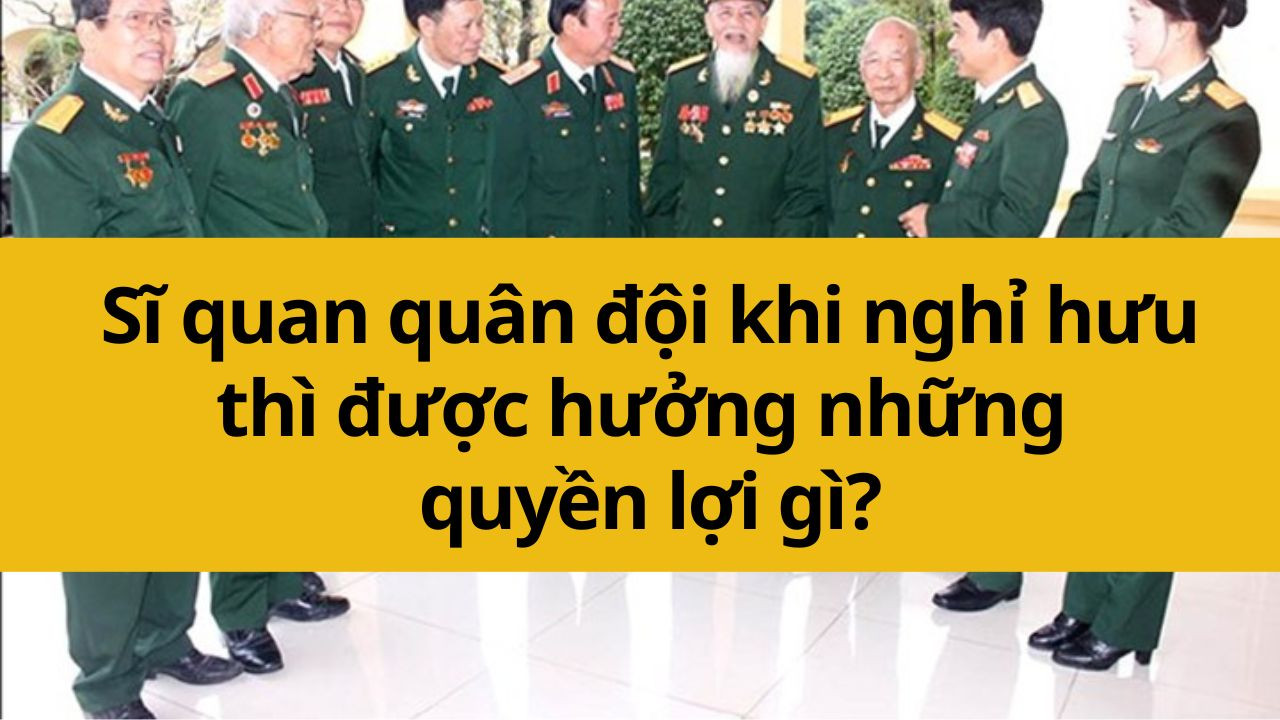
Sĩ quan quân đội khi nghỉ hưu thì được hưởng những quyền lợi gì mới nhất 2025?
Việc nghỉ hưu của sĩ quan quân đội không chỉ đánh dấu một chặng đường dài phục vụ tổ quốc mà còn gắn liền với các quyền lợi và chế độ đặc biệt, nhằm đảm bảo đời sống ổn định cho họ sau khi rời quân ngũ. Trong năm 2025, các quy định về quyền lợi của sĩ quan nghỉ hưu có những điểm mới quan trọng, bao gồm chế độ lương hưu, trợ cấp một lần, cũng như các quyền lợi về khám chữa bệnh, nhà ở, và các phúc lợi khác. Bài viết này sẽ cập nhật các quyền lợi mà sĩ quan quân đội được hưởng khi nghỉ hưu theo các quy định mới nhất, nhằm giúp hiểu rõ hơn về chế độ chính sách dành cho họ. 31/12/2024Tuổi nghỉ hưu của sĩ quan quân đội mới nhất 2025
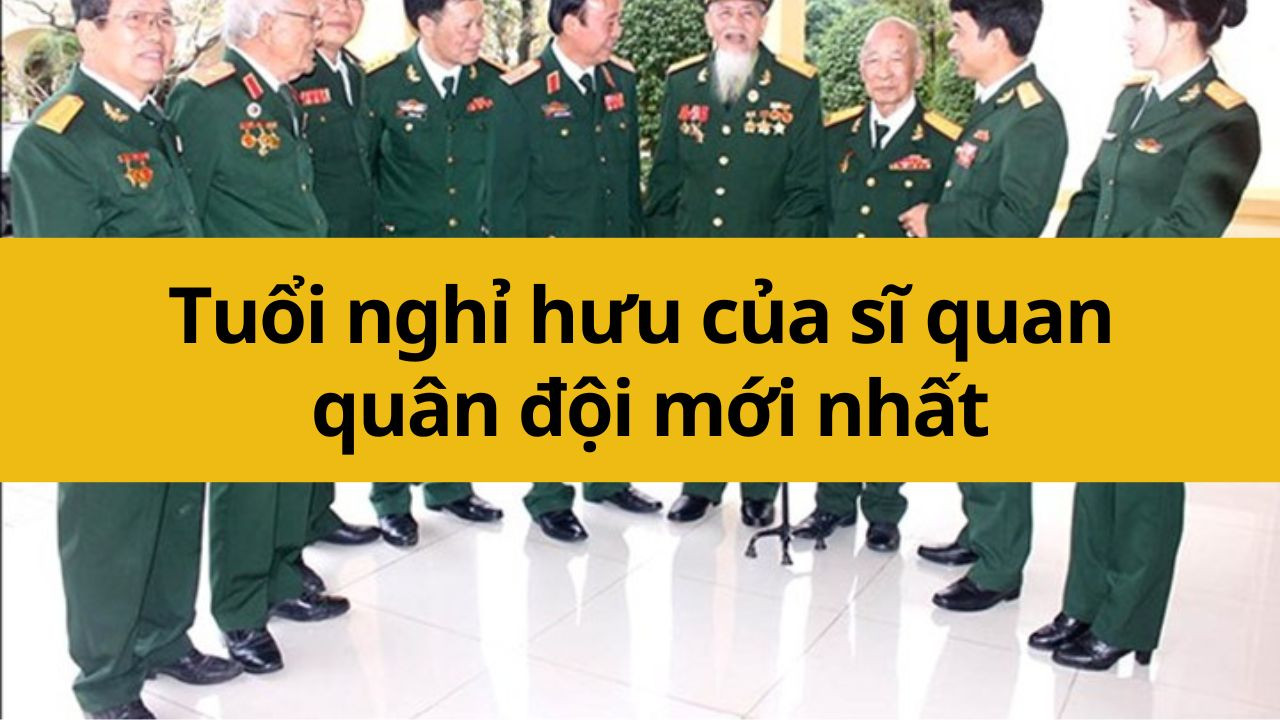
Tuổi nghỉ hưu của sĩ quan quân đội mới nhất 2025
Trong quân đội, việc xác định tuổi nghỉ hưu của sĩ quan là một vấn đề quan trọng, ảnh hưởng trực tiếp đến công tác tổ chức và điều động cán bộ. Mỗi năm, các quy định về tuổi nghỉ hưu có thể được điều chỉnh nhằm đáp ứng yêu cầu phát triển của lực lượng vũ trang và tình hình thực tế của đất nước. Bài viết này sẽ cập nhật thông tin mới nhất về tuổi nghỉ hưu của sĩ quan quân đội, giúp hiểu rõ hơn về các quy định và chính sách liên quan. 31/12/2024Từ 01/7/2024 mức lương Trung úy quân đội nhân dân là bao nhiêu khi mức lương cơ sở thay đổi?
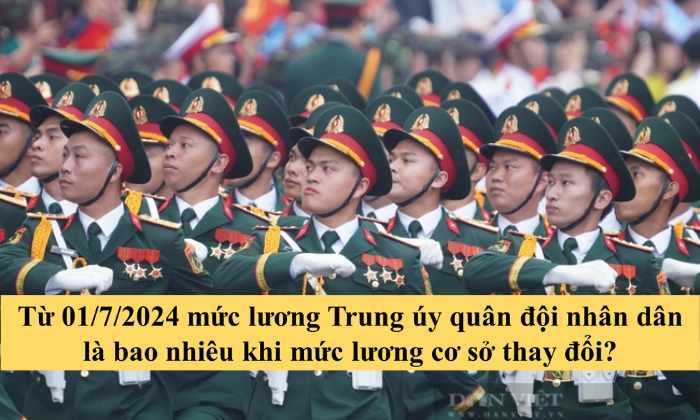
Từ 01/7/2024 mức lương Trung úy quân đội nhân dân là bao nhiêu khi mức lương cơ sở thay đổi?
Từ ngày 01/7/2024, mức lương cơ sở sẽ có sự điều chỉnh, kéo theo những thay đổi về thu nhập của cán bộ, công chức, viên chức, và lực lượng vũ trang, bao gồm cả Quân đội nhân dân Việt Nam. Đối với Trung úy - một trong những cấp bậc sĩ quan quan trọng trong quân đội, câu hỏi đặt ra là mức lương của họ sẽ thay đổi như thế nào khi áp dụng mức lương cơ sở mới? Bài viết này sẽ cung cấp thông tin chi tiết về mức lương của Trung úy Quân đội nhân dân sau khi mức lương cơ sở chính thức điều chỉnh vào tháng 7/2024. 09/11/2024Binh sĩ dự bị hạng hai bao gồm những đối tượng nào? Huấn luyện binh sĩ dự bị hạng hai phải đạt những yêu cầu gì?
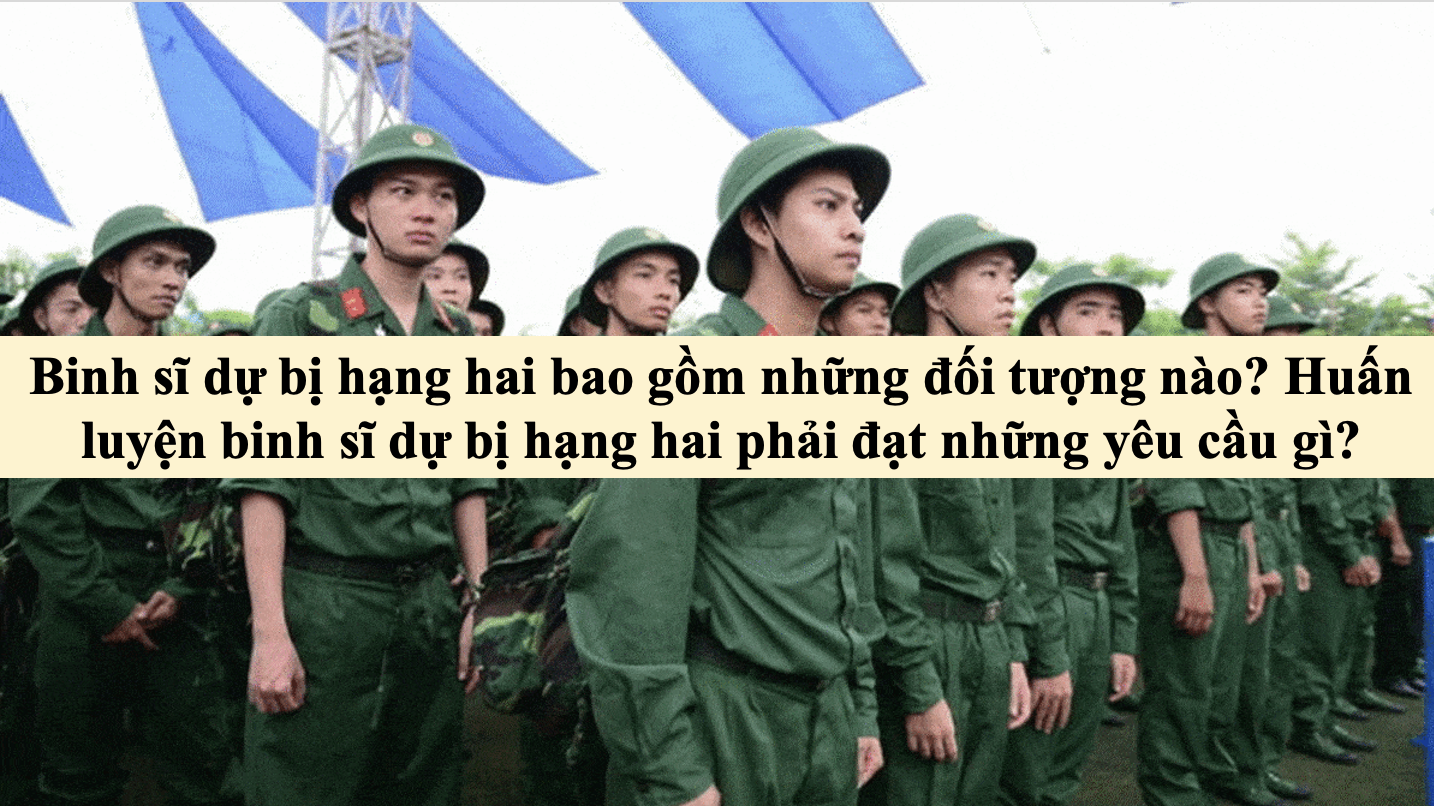

 Luật Sĩ quan Quân đội nhân dân Việt Nam 1999 (Bản Word)
Luật Sĩ quan Quân đội nhân dân Việt Nam 1999 (Bản Word)